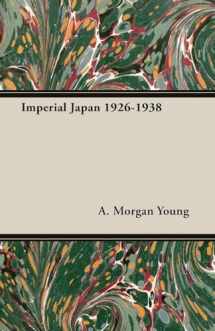
Imperial Japan 1926-1938
ISBN-13:
9781443721950
ISBN-10:
1443721956
Author:
a Morgan Young
Publication date:
2008
Publisher:
Read Books
Format:
Hardcover
332 pages
FREE US shipping
Book details
ISBN-13:
9781443721950
ISBN-10:
1443721956
Author:
a Morgan Young
Publication date:
2008
Publisher:
Read Books
Format:
Hardcover
332 pages
Summary
Imperial Japan 1926-1938 (ISBN-13: 9781443721950 and ISBN-10: 1443721956), written by authors
a Morgan Young, was published by Read Books in 2008.
With an overall rating of 3.8 stars, it's a notable title among other
books. You can easily purchase or rent Imperial Japan 1926-1938 (Hardcover) from BooksRun,
along with many other new and used
books
and textbooks.
And, if you're looking to sell your copy, our current buyback offer is $0.46.
Description
MANY are the books on Japan they mostly follow a prescription, reviewing different aspects of a country which is strangely unlike the lands of Christendom, though it has entered into economic competition with them. I have here tried to present something rather different. Encouraged by the fact that Japan in Recent Times, 1912-1926, has been found useful by other makers of books as well as by readers who sought to increase their knowledge, I have attempted here to present a sequel though it is only part of the same story in the sense that it continues the record. A reign that seemed likely to be quiet and humdrum has proved so full of happenings that it has been difficult, even at slightly greater length, to record these eleven years as adequately as the previous sixteen. But for readers who would like the facts rather than my gloss upon them, here is a book full of them. During ten of the eleven years I was seldom absent from the editorial desk of the Japan Chronicle., so there was little about current events that did not come my way, and I have tried to select from the mass the most significant and most closely related. Sometimes so many things were happening at once that it has been impossible to observe a strict chronology and the subject rather than the date has had to be considered. As in my previous book I have adhered to the Japanese custom of putting the surname first and the personal name after also, where titles are concerned, I have used the highest attained instead of explaining that the Mr. of one day was the Baron of the next. Contents include: I. A NEW ERA II II. THE FINANCIAL CRISIS OF IQ27 22 III. TANAKA AND JAPANS MANCHURIA POLICY 27 IV. THE PROLETARIAT VOTES 34 V. THE MURDER OF CHANG TSO-LIN 39 vi. LIBERALISMS LAST EFFORT 48 VII. THE MANCHURIAN BACKGROUND 63 VIII. THE GATHERING OF THE CLOUDS 71 IX. THE BREAKING OF THE STORM 79 X. THE TAKING OF MANCHURIA 92 XI. JAPAN ACTS WHILE THE COUNCIL TALKS IO8 XII. THE END OF DEMOCRACY IN JAPAN 113 XIII. THE NEW STATE OF MANCHUKUO 122 XIV. THE HIGHEST FORM OF PATRIOTISM 127 XV. THE HORROR OF SHANGHAI 131 XVI. THE GALLANT FIGHT OF MA CHAN-SHAN 145 XVII. THE ART OF RECOGNITION 151 XVIII. THE MANCHURIAN AFTERMATH 165 XIX. SAITO AND THE SPENDING POLICY 176 XX. TRIALS EXTRAORDINARY 189 XXL JAPANS AEGIS OVER THE MAINLAND 201 XXII. THE BOOM IN MANUFACTURE 212 xxiii. JAPANS NEW EMPIRE 225 io IMPERIAL JAPAN CHAPTER PAGE XXIV. THE DETERIORATION OF THOUGHT 238 XXV. THE FAR EAST AND EASTERN ASIA 250 XXVI. UNEASY NATIONALISM 262 XXVII. BIGGER AND BETTER MURDERS 268 XXVIII. THE SUN GODDESS EXTENDS HER KINGDOM 286 NOTES 301 INDEX 321. CHAPTER I: A NEW ERA FOLLOWING a Chinese custom, Japan begins a new era with each reign. When the Taisho era ended on Christmas Day, 1926, Taisho was made the posthumous name of the deceased Emperor, and the new era was named Showa. Taisho meant Great Righteousness, and the reign of sixteen years had been distinguished by the number of scandals and the greatness of the corruption in its history. Showa might be translated Peace made Manifest, and was to be marked by a constant prating about Japans sacred mission of keeping the peace of the Far East, and by a progressive breaking of that peace and a cynical disregard of truth and justice. Yet the reign began with a sense of disillusionment and almost of exhaustion. The damage caused by the great earthquake of September 1923 was only partly repaired, and Mr. Inoue Jonnosuke, who had been Governor of the Bank of Japan and was to be Finance Minister, declared early in 1927 that the 400,000,000 profit which Japan had made out of the Great War, had been frittered away and not left a trace...


We would LOVE it if you could help us and other readers by reviewing the book
Book review

Congratulations! We have received your book review.
{user}
{createdAt}
by {truncated_author}


